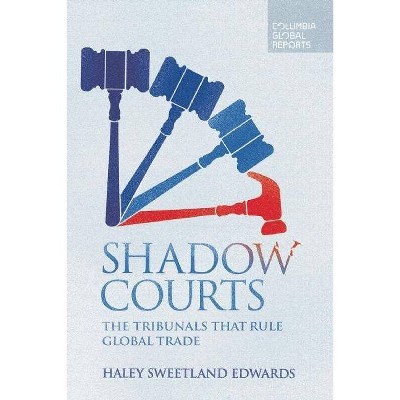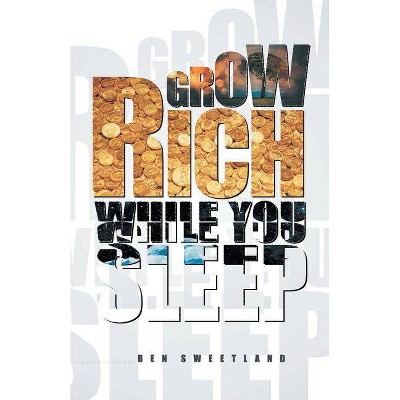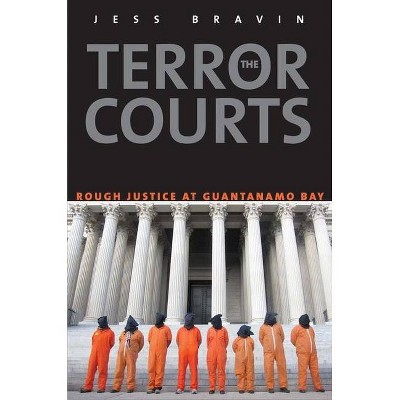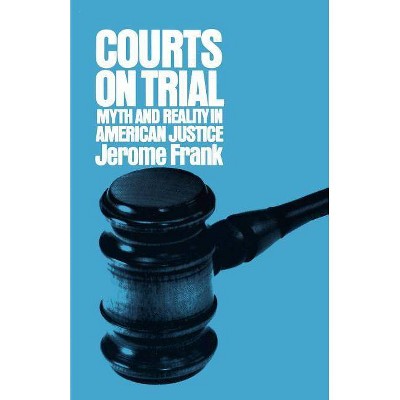Shadow Courts - by Haley Sweetland Edwards (Paperback)

Similar Products
Products of same category from the store
AllProduct info
<p/><br></br><p><b> About the Book </b></p></br></br>"Edwards offers a ... look at one little-known but powerful provision in most modern trade agreements that is designed to protect the financial interests of global corporations against the governments of sovereign states. She [posits] that Investor-State Dispute Settlement --a 'shadow court' that allows corporations to sue a nation outside its own court system--has tilted the balance of power on the global stage"--Amazon.com.<p/><br></br><p><b> Book Synopsis </b></p></br></br><b>A detailed look at one little-known but powerful provision in most modern trade agreements.</b> <p/> International trade deals have become vastly complex documents, seeking to govern everything from labor rights to environmental protections. This evolution has drawn alarm from American voters, but their suspicions are often vague. <p/> In this book, investigative journalist Haley Sweetland Edwards focuses on one crucial aspect of these massive agreements: a powerful provision called Investor-State Dispute Settlement, which allows foreign corporations to sue sovereign nations before little-known supranational arbitration tribunals. <p/> Edwards makes a devastating case that these tribunals (the shadow courts of the book's title), which were designed 50 years ago to protect foreign investors' property rights abroad, are now being exploited by multinational corporations at the expense of sovereign nations and their citizens. From the 1960s to 2000, corporations brought fewer than 40 cases through these tribunals. In the last 15 years, they've brought nearly 650. <p/> In the course of her reporting, Edwards interviewed dozens of policymakers, activists, and government officials in Argentina, Canada, Bolivia, Ecuador, the European Union, and the United States. The result is a major story, untold before now, about a significant shift in the global balance of power.<p/><br></br><p><b> Review Quotes </b></p></br></br><br>I read it in one night and felt like underlining every word of every page. <b>--Cathy O'Neil, author of <i>Weapons of Math Destruction: How Big Data Increases Inequality and Threatens Democracy</i></b> <p/> One of those wonderful, short books from Columbia Global Reports. <b>--Felix Salmon, Slate Money</b> <p/> <i>Shadow Courts</i> shows how ISDS threats have strained support for free trade around the world. <b>--<i>Politico</i></b> <p/>This slim, timely book discusses the history of the provision and the effects that ISDS litigation--a tactic not available to domestic firms--has had on social and environmental legislation and regulation. The version of the ISDS system that has evolved is not likely to withstand close scrutiny. <b>--G. John Ikenberry, <i>Foreign Affairs</i></b> <p/> This book is a short, vital introduction to [Investor-state dispute settlement] history and use, the shocking ways in which corporations have used it to bend governments to their will, and the total lack of justification for using such mechanisms in developed, stable countries. <b>--<i>The Week</i></b> <p/><i>Time</i> investigative reporter Edwards charges that the controversial Investor-State Dispute Settlement tribunals at the heart of many current trade deals represent a major shift in global relations in favor of private corporate interest.... Edwards does a great service for the public by turning the spotlight of disclosure on this dark corner of international relations. <b>--<i>Kirkus Reviews</i></b> <p/> Haley Sweetland Edwards explains the history of global shadow courts and how these courts have spun out of control, threatening the interests of citizens everywhere including in the United States. Her fantastic book is exactly what long-form journalism is meant to do, to move beyond current events and provide historical perspective that aims at future reform. Shadow Courts should be at the top of the reading list of all those interested in redesigning trade agreements to be in the public interest. <b>--Jeffrey D. Sachs, University Professor, Columbia University, author of <i>The End of Poverty</i></b> <p/> I read it in one night and felt like underlining every word of every page. <b>--Cathy O'Neil, author of <i>Weapons of Math Destruction: How Big Data Increases Inequality and Threatens Democracy</i></b><br><p/><br></br><p><b> About the Author </b></p></br></br><b>Haley Sweetland Edwards</b> is a correspondent at <i>Time</i>. Previously, she was an editor at the <i>Washington Monthly</i>, where she wrote about policy and regulation. From 2009 to 2012, she lived and worked in the Middle East and the former Soviet Union, where she wrote for <i>The Los Angeles Times</i>, <i>The Atlantic</i>, and <i>The New Republic</i>, among other publications. She studied philosophy at Yale and journalism at Columbia University's Graduate School of Journalism. She lives in Washington, D.C.<br>
Price History
Price Archive shows prices from various stores, lets you see history and find the cheapest. There is no actual sale on the website. For all support, inquiry and suggestion messagescommunication@pricearchive.us




















